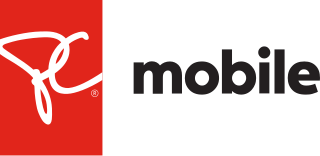
The Canadian Radio-television and Telecommunications Commission is a public organization in Canada with mandate as a regulatory agency for broadcasting and telecommunications. It was created in 1976 when it took over responsibility for regulating telecommunication carriers. Prior to 1976, it was known as the Canadian Radio and Television Commission, which was established in 1968 by the Parliament of Canada to replace the Board of Broadcast Governors. Its headquarters is located in the Central Building of Les Terrasses de la Chaudière in Gatineau, Quebec.
A SIM lock, simlock, network lock, carrier lock or (master) subsidy lock is a technical restriction built into GSM and CDMA mobile phones by mobile phone manufacturers for use by service providers to restrict the use of these phones to specific countries and/or networks. This is in contrast to a phone that does not impose any SIM restrictions.

Bell Mobility Inc. is a Canadian wireless network operator and the division of Bell Canada which offers wireless services across Canada. It operates networks using LTE and HSPA+ on its mainstream networks. Bell Mobility is the third-largest wireless carrier in Canada, with 10.1 million subscribers as of Q3 2020.
Rogers Wireless Inc. is a Canadian wireless telephone company headquartered in Toronto, providing service nationally throughout Canada. It is a wholly owned subsidiary of Rogers Communications. The company had revenues of just under $15.1 billion in 2018. Rogers Wireless is the largest wireless carrier in Canada, with 11.3 million subscribers as of Q2 2023.

Fido Solutions Inc. is a Canadian mobile network operator owned by Rogers Communications. Since its acquisition by Rogers in 2004, it has operated as a Mobile virtual network operator (MVNO) using the Rogers Wireless network.
TracFone Wireless, Inc. (TFWI) is an American prepaid, no-contract mobile phone provider. TFWI is a subsidiary of Verizon Communications, and offers products and services under several brands. It operates as a mobile virtual network operator (MVNO), holding agreements with the three largest United States wireless network operators to provide service: AT&T Mobility, T-Mobile US, and Verizon.
Telus Mobility is a Canadian wireless network operator and a division of Telus Communications which sells wireless services in Canada on its numerous networks. It operates 5G, LTE and HSPA+ on its mainstream networks. Telus Mobility is the second-largest wireless carrier in Canada, with 10.6 million subscribers as of Q3 2020.

A mobile phone feature is a capability, service, or application that a mobile phone offers to its users. Mobile phones are often referred to as feature phones, and offer basic telephony. Handsets with more advanced computing ability through the use of native code try to differentiate their own products by implementing additional functions to make them more attractive to consumers. This has led to great innovation in mobile phone development over the past 20 years.

Cricket Wireless is an American prepaid wireless service provider, owned by AT&T. It provides wireless services to ten million subscribers in the United States. Cricket Wireless was founded in March 1999 by Leap Wireless International. AT&T acquired Leap Wireless International in March 2014, and later merged Cricket Wireless operations with Aio Wireless. Cricket Wireless competes primarily against T-Mobile's Metro by T-Mobile, Dish's Boost Mobile and Verizon's Visible in the prepaid wireless segment.

Tethering or phone-as-modem (PAM) is the sharing of a mobile device's Internet connection with other connected computers. Connection of a mobile device with other devices can be done over wireless LAN (Wi-Fi), over Bluetooth or by physical connection using a cable, for example through USB.
The term, Subsidy Password, is used by Motorola and other handset manufacturers to refer to the 8-digit code unlock code necessary to remove the operator lock from cell phones. This code is randomly assigned to individual cell phones by the OEM on request of the mobile service operator and prevents the use of a particular phone on a cellular network other than that to which the phone was originally sold.

The BlackBerry Pearl was a series of smartphones developed by Research In Motion, and was the first BlackBerry device with a camera and media player. It was originally released on September 12, 2006. T-Mobile was the first US carrier to release the phone as a carrier device. The last BlackBerry Pearl released was the 9100 series on May 13, 2010. After this model was cleared out, RIM discontinued the Pearl series.

Koodo Mobile is a Canadian mobile flanker brand started by Telus in 2008 and mostly oriented toward younger customers. Koodo differs from its parent Telus by not requiring a fixed term contract. Koodo currently provides postpaid, prepaid, and wireless home phone services. Being a subsidiary of Telus, Koodo has been able to offer extensive coverage and a strong presence in mobile retailers. This allowed Koodo to gain a presence nationwide.
Net neutrality in Canada is a debated issue, but not to the degree of partisanship in other nations, such as the United States, in part because of its federal regulatory structure and pre-existing supportive laws that were enacted decades before the debate arose. In Canada, Internet service providers (ISPs) generally provide Internet service in a neutral manner. Some notable incidents otherwise have included Bell Canada's throttling of certain protocols and Telus's censorship of a specific website critical of the company.

Bruce Tolhurst Hyer is a Canadian politician, businessman, and ecologist. He is the former deputy leader of the Green Party of Canada and the former Member of Parliament for Thunder Bay—Superior North. Hyer was elected in the 2008 federal election, and re-elected with a wider margin in the 2011 federal election; on both occasions while standing for the New Democratic Party.

Freedom Mobile Inc. is a Canadian wireless telecommunications provider owned by Quebecor. It has 6% market share of the Canadian wireless market, mostly in urban areas of Ontario, British Columbia and Alberta. Freedom Mobile is the fourth-largest wireless carrier in Canada, with 2,290,497 subscribers as of November 30, 2022.

Data and Audio-Visual Enterprises Wireless, d/b/a Mobilicity, was a Canadian mobile virtual network operator (MVNO) owned by Rogers Communications. Its name was a portmanteau of the words "mobility" and "simplicity". Mobilicity was one of several new mobile network operators, along with Public Mobile and Wind Mobile, which launched in Canada after a government initiative to encourage competition in the wireless sector. The carrier had over 250,000 Mobilicity subscriptions on May 16, 2013, the day in which Telus announced its failed attempt to acquire Mobilicity. The subscription count decreased to 157,000 by April 2015 according to court documents filed by Mobilicity's Chief Restructuring Officer in that month.
Rooting is the process by which users of Android devices can attain privileged control over various subsystems of the device, usually smartphones. Because Android is based on a modified version of the Linux kernel, rooting an Android device gives similar access to administrative (superuser) permissions as on Linux or any other Unix-like operating system such as FreeBSD or macOS.

PC Mobile is a licensed white label prepaid wireless service operated in Canada. Its mobile telephone products and services operate on the network infrastructure operated by Bell Mobility and formerly Telus Mobility, but licensed the proprietary branding and payment media with the President's Choice supermarket store brand owned by Loblaws Inc. It also operates mobile phone kiosks in Loblaws banner stores under the name The Mobile Shop.

The Unlocking Consumer Choice and Wireless Competition Act is a United States public law that repeals a rulemaking determination by the United States Copyright Office that left it illegal for people to unlock their cellphones.













